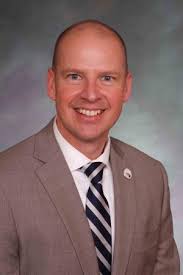An omnibus election law revision first introduced in the Colorado House of Representatives March 27 led to many hours of debate on the floor of the House over two days.
Debate Monday over a provision in House Bill 19-1278 that would make it illegal to place ballot boxes or voting stations in any “police station, sheriff’s office or town marshal’s office” unless they are part of a “multipurpose building” centered around the unexplained rationale of sponsors Susan Lontine, D-Denver, and Sen. Stephen Fenberg, D-Boulder.

Republican representatives who took the podium strongly objected to the disrespect they felt the ban showed towards law enforcement. They repeatedly asked the bill’s sponsors for an explanation of the provision, without any success.
In a Tweet sent just before noon, former state representative Joe Salazar responded to a question by Lynn Bartels, former Communications Director for former Secretary of State Wayne Williams about why the provision should be in the bill.
“I suppose if anyone studied any American History, they would know that law enforcement was typically used to discourage people of color from voting,” said Salazar. “It’s good to make things clear in the statute.”
Neither Salazar nor Lontine addressed Colorado’s historical practice of using police, sheriff and marshal’s offices as polling places. Nor did the sponsors provide any evidence of historic voter suppression at such polling places.
Rep. Lori Saine, R-Firestone, said that many people in small towns are accustomed to voting at their local law-enforcement building and might be unnecessarily confused by a change of location. She also pointed out that alternative venues for voting may be hard to come by in remote areas, and that the bill might require county clerks to rent commercial space instead of using available public buildings.
The floor debate went on for hours with Republicans proposing amendment after amendment and Democrats refusing to come to the podium to explain why the provision should remain.
This was a continuation of the second reading, laid over from April 19. In all 24 amendments were proposed during the two floor hearings, with 17 being adopted.
At one point during debate on an amendment to remove this restriction, Rep. Lois Landgraf, R-Fountain, brought up the issue of the Americans with Disabilities Act (ADA) and the burden that the provision would place on county clerks trying to find voting locations in small towns that were compliant with federal regulations.
Rep. Tim Geitner, R-El Paso, seized upon this and began reading a 30-plus page ADA federal voting-place compliance document into the record.

A short way into his reading, the Chair, Speaker Pro Tempore Janet Buckner, D-Aurora, gaveled Geitner down, saying that the reading of the document was not “to the amendment,” but could be read “to the bill” later.
Filibustering, which is to say speaking or reading about things not associated with the matter under consideration merely to expend time are prohibited in Colorado.
Geitner objected, saying, “I think it’s important that we consider second and third impacts,” and that the ADA was pertinent to the amendment.
Some discussions took place at the dais, and as they did Geitner began reading again. He was quickly gaveled to silence again by Buckner, who admonished him that the Chair had ruled the reading improper.
Geitner, frustrated by the decision then called for the bill to be read at length. Any time this request is made the body must do so.
Everything came to a halt as the bill was read at length by a computer.
Earlier in the session, Democrats tried to use multiple computers each reading parts of a bill at the same time at incomprehensible speeds to shorten the delay, only to have an injunction issued by a District Court judge saying that the reading had to be understandable by listeners.
The electronic reading of the 61-page bill took more than an hour and a half.
At 3:35 p.m., as soon as the reading concluded and long after floor business has ordinarily been concluded and committee hearings scheduled for 1:30 p.m. are underway, House Majority Leader Alec Garnett, D-Denver, as Chair adjourned the House so committee hearings could proceed.
At about 7 p.m. the House reconvened to finish the day’s business, starting with HB 1278.
During the break some compromise must have been stuck as Geitner took to the podium and proceeded to finish reading the ADA document.
Shortly after he concluded the motion was lost and the bill passed on a voice vote at 8:45 p.m.
The bill passed out of the House on third reading Tuesday and is assigned to the Senate State, Veterans, & Military Affairs Committee.


